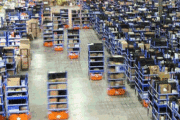A Definition of Amazon FBA

What is Amazon FBA? FBA stands for Fulfillment by Amazon. To sum it up, this broad term means that Amazon fulfills your customers’ orders for you. The basics: When you sign up as an FBA seller, you send your inventory to any of Amazon’s FBA warehouses (Amazon will specify which location you need to ship your inventory to). When you receive an order, Amazon ships it instead of you handling the shipping yourself.
Fulfillment by Amazon, was created to keep up Amazon’s strict commitment to customer satisfaction. When Amazon handles your inventory, shipping, returns, etc., they are able to keep the majority of customer service in their hands and out of yours as a seller.
What is Amazon FBA Beneficial For?

Amazon FBA Increases Profit. Many sellers make huge amounts of money by selling through FBA. One of the great perks is that as a seller, you can avoid the costs and aggravation of storing inventory, dealing with shipping, and other similar issues.
Amazon FBA Qualifies Your Listings for Amazon Prime, Free Shipping and Other Benefits. When you sell through FBA, you’re able to reap the benefits of Amazon Prime, a service that just about every Amazon customer knows and loves. You also receive the benefit of free shipping on eligible products, and the “gold star” next to your listings – that is, the Amazon Prime logo.
Amazon FBA is cost-efficient. All of your shipping fees (including Amazon Prime and free shipping) are included in your fees with no extra charge. Plus, you’re only charged for the storage space and the orders you fulfill.
Amazon FBA Takes the Stress Out of Customer Service. What is FBA handy for besides inventory management, shipping, and a sales boost? Less stress. As an FBA seller, you don’t need to worry as much about dealing with customers – Amazon will handle the customer service and returns for you.
Amazon FBA Allows Multi-Channel Fulfillment. This is one of the best perks of becoming an Amazon FBA Seller – Multi-Channel Fulfillment. That means the inventory you store in Amazon’s fulfillment centers isn’t only eligible for sales on Amazon – your inventory can be sold on other e-commerce platforms through the FBA warehouses, even though the warehouses are of course, operated by Amazon.
Downsides of Amazon FBA
What is Amazon FBA not beneficial for? There are a few downsides of FBA that you should consider before signing on to become an FBA seller. Here is a quick rundown of the negative aspects of FBA.
Strict Requirements for Shipping. Depending on your product, you will need to abide by the rules and regulations set forth by Amazon FBA when it comes to shipping. For example, here are a few of the packaging rules for shipping products through FBA:
- Remove every old shipping label or any other marking, logo or branding if you are reusing boxes
- Use exactly 2 inches of padding between all of the items inside your shipment box.
- All barcodes must be completely covered up or removed entirely if you use recycled boxes for FBA shipments.
Strict Requirements for Packing Items. When you send items to an FBA warehouse, you need to use only the specified materials to pack your products. That means bubble wrap, polyethylene foam, sheets of paper, or air pillows that can be inflated. Nothing else. If you use foam peanuts, any other packing peanut material, wrap that may crinkle, or paper that shreds, your FBA shipment will be returned – and you’ll have to pay for it. Amazon FBA is detrimental if you do not follow the regulations Amazon sets forth.
Inventory Risks if Your Account is Suspended. If you have inventory in FBA and your seller account gets suspended, you must handle the suspension immediately or risk losing your inventory. This can be very risky if you have very valuable items stored in the FBA warehouses.
Overall, the benefits of Amazon FBA make it quite enticing for sellers. When you sell on FBA, it can catapult your business a thousand times over as long as you follow the rules and regulations.

